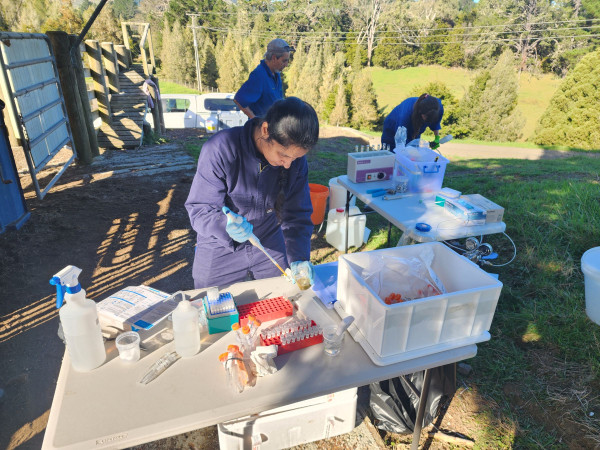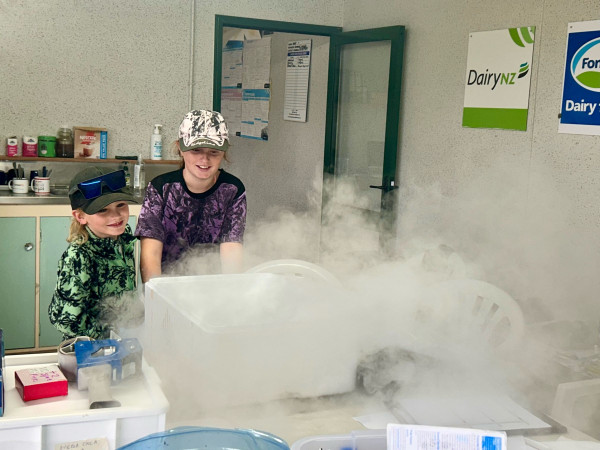The recent sampling work, undertaken by scientists from our Rumen Microbiology and Animal Nutrition and Physiology teams in the Far North of the North Island was part of the AgResearch Flagship Programme, Animals of the Future, which is part of our wider research to ensure Aotearoa New Zealand’s pastoral agriculture systems are resilient and economically viable in the face of climate change.
With long, hot dry periods becoming increasingly common, ryegrass is often burnt off during summer and becomes dominated by the tropical grass Kikuyu. While edible to animals, it has its own challenges. Kikuyu fibre tends to be more resistant to digestion than temperate pasture grasses, resulting in longer retention time in the rumen, causing more energy loss during digestion and if not well managed leading to digestive issues with the animals.
Ruminant animals have evolved over millions of years to ingest, break down, and extract energy from various types of fibres. In this digestive process, the rumen microbiota plays an essential role and adapts over time to new pastures. The long adaptations found in the far north provide an unrivalled natural laboratory to better understand components of this microbiota helping this break down when compared to other pastures.

Steve Archer says Kikuyu-dominated farms from four locations across Northland were visited, and samples from over 40 animals from each farm were collected. DNA-based metagenomic analyses will now provide insights into these microbial activities and their links to sustainable animal productivity on Kikuyu dominated pastures.
“This required samples to be frozen rapidly on-site with dry ice and maintained until they could be safely stored back in Palmerston North laboratory facilities,” Steve says.
What made this trip unique and even more valuable was an additional focus on isolating rumen bacteria and fungi on-site. As the rumen is anaerobic (there is almost no oxygen), and warm, this required the use of incubators and gassing of samples from the Far North back to the laboratory over several days of sampling.
“By maintaining these conditions, we ensured that as many isolates of rumen microbes as possible survived, allowing for the pure microbial isolations and proper characterisation of potentially new organisms,” Steve says.
The Rumen Microbiology team has over 40 years of experience cultivating these organisms and is a world leader with a collection of hundreds of isolated micro-organisms central to millions of dollars of active research across the globe.

Steve says the sampling trip will add to the existing rumen culture collection, with organisms adapted to Kikuyu grass. This will be the basis for understanding rumen function under these challenging conditions but also creating probiotics/ microbial feed additives that will help with the breakdown of harder forages, enhancing digestion for those that haven’t adapted to the harsh diet.
“An important component of this trip was the opportunity for agricultural scientists and farmers to meet and discuss what science is needed and also expose Northland children to some unique science experiences. The first two hosts organised a social function that included over 20 farmers across the region, showing true Northland hospitality and enthusiasm towards the work we were undertaking. There were even some future scientists at each location who were able to learn while helping us conduct our work.”
The field team was: Steve Archer, Priya Soni, German Molano, Maria Della Rosa and Nik Palevich.